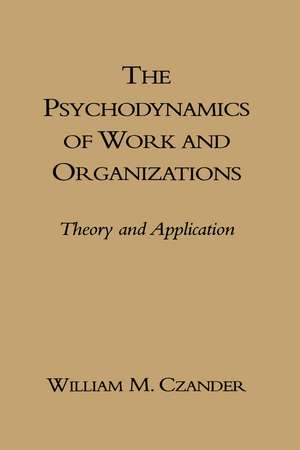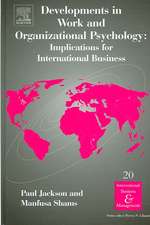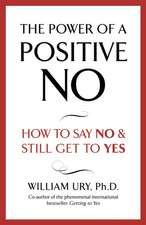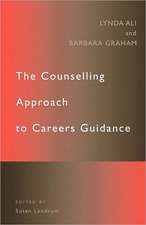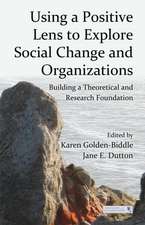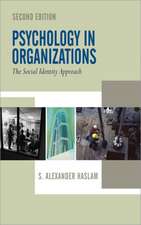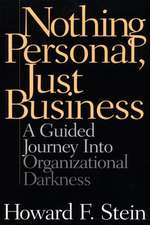The Psychodynamics of Work and Organizations: Theory and Application
Autor William M. Czanderen Limba Engleză Hardback – 14 dec 1993
An individual's working life undergoes the same intrapsychic conflicts as other aspects of experience. Yet, as a subject of psychoanalytic inquiry, the world of work has largely been ignored. In this innovative book, William M. Czander demonstrates that applying depth psychology to the organization and its employees provides a deeper understanding of the American workplace than traditional industrial psychology has offered. Using a psychoanalytic framework, Czander examines such issues as interactions between employees and management, the conscious and unconscious forces that bind fellow employees together, and the role of autonomy in people's lives. Most important, he details a means of intervention in the form of organizational consultation based on this more profound conceptualization of the dynamics of the workplace.
The first section of the book presents theoretical background, and the second applies theory to specific cases. Czander presents three major theories of psychoanalysis as they relate to work and the organization: Freudian and classical psychoanalytic theory, object relations theory, and self psychology theory. He explores how a psychoanalyst thinks about work and how work and the organization interact with the employees' unconscious motivations and ideation. He then applies these theories to actual case studies of organizational consultations. The consultation process is explained, including how a particular diagnosis and rationale for intervention is obtained. Czander concludes with a discussion of the practice of psychoanalytic consulting and its utility and relevance to the world of contemporary organizations.
Providing illuminating discussion on myriad issues related to the psychology of the workplace, this book is an ideal resource for a variety of mental health professionals: psychoanalysts especially interested in organizational consulting, organizational psychologists desiring a new perspective on their work, and clinicians from different disciplines whose clients are struggling with issues surrounding their work environments. It serves as an advanced text for courses in industrial organization, clinical and social work, and business management.
Preț: 441.85 lei
Preț vechi: 465.11 lei
-5% Nou
Puncte Express: 663
Preț estimativ în valută:
84.57€ • 91.90$ • 71.09£
84.57€ • 91.90$ • 71.09£
Carte tipărită la comandă
Livrare economică 21 aprilie-05 mai
Preluare comenzi: 021 569.72.76
Specificații
ISBN-13: 9780898622843
ISBN-10: 0898622840
Pagini: 408
Dimensiuni: 152 x 229 x 30 mm
Greutate: 0.76 kg
Ediția:New.
Editura: Guilford Publications
Colecția Guilford Press
ISBN-10: 0898622840
Pagini: 408
Dimensiuni: 152 x 229 x 30 mm
Greutate: 0.76 kg
Ediția:New.
Editura: Guilford Publications
Colecția Guilford Press
Public țintă
Postgraduate, Professional, Professional Practice & Development, and UndergraduateCuprins
Introduction.
I. THEORY.
1. Freud and Work.
2. Object Relations Theory and Work.
3. Self Psychology.
4. The Relationship Between Intrapsychic Structure and Organizational Structure.
5. Understanding Work and the Organization from the Psychoanalytic Perspective.
II. APPLICATION.
6. Review of Current Methods of Consultation.
7. Psychoanalytic Consultation.
8. Boundary Maintenance and Regulation.
9. Task Analysis.
10. Authority.
11. The Taking of a Role.
12. Interorganizational Relations.
13. Dependent and Autonomous Structures.
14. Management and Change.
References.
Index
I. THEORY.
1. Freud and Work.
2. Object Relations Theory and Work.
3. Self Psychology.
4. The Relationship Between Intrapsychic Structure and Organizational Structure.
5. Understanding Work and the Organization from the Psychoanalytic Perspective.
II. APPLICATION.
6. Review of Current Methods of Consultation.
7. Psychoanalytic Consultation.
8. Boundary Maintenance and Regulation.
9. Task Analysis.
10. Authority.
11. The Taking of a Role.
12. Interorganizational Relations.
13. Dependent and Autonomous Structures.
14. Management and Change.
References.
Index
Notă biografică
William M. Czander graduated Phi Beta Kappa from City College of New York, received his Ph.D. from New York University, and postdoctoral training at the Institute for Social and Policy Studies at Yale University and the Psychoanalytic Institute of the Postgraduate Center for Mental Health in New York City. A member of the Psychoanalytic Institute of the Postgraduate Center, he has served on the faculty in the School of Business at Manhattan College in Riverdale, New York since 1981. Dr. Czander practices organizational consulting and psychoanalysis in Irvington on Hudson, New York.
Recenzii
Czander understands, as few psychologists do, that the modern organization rivals, even surpasses, the family as the primary source of deep psychological meaning in our lives. --Peter M. Newton, Ph.D., The Wright Institute
This is a superb and extremely timely text. It is well written and represents an original contribution to the literature on the application of psychodynamic thinking to organizational life and work and to understanding the complexity of organizational assessment and consultation. It will be indispensable to organizational consultants, students of psychoanalytic theory and to managers who 'think analytically.'
The first part of this book presents well-balanced, comprehensive contemporary integrations of Freud's classical psychoanalytic theory, object relations theories and self psychology theory. A major contribution to our dynamic understanding of work and organizational life.
This book is unique in that it describes in some detail the way in which one thinks about an organizational psychoanalytically--that is, how one tries to understand the organization in terms of themes and metaphors, what one looks for overtly and covertly, how one attempts to interpret these data and how one translates these understandings into interpretive interventions. In addition to an excellent summary of nine models of organizational consultation, Dr. Czander presents for the first time a detailed analysis and description of psychoanalytic consulting and the guideposts which define this model. One of the most creative features of this book is the application of this psychoanalytic model to organizational problems in the areas of task analysis, the exercise of authority, the taking of a role, inter-organizational subsystem relations, and the tensions between autonomous and dependent structures. Consultations to these problem areas are richly and clearly illustrated with selective case material.
This is clearly one of the most sophisticated texts in this area and belongs in the same league with the work of deBoard, Kets de Vries, Hirschhorn, and Rice. --Solomon Cytrynbaum, Ph.D., Northwestern University
A comprehensive fundamental volume which gives structure to the whole field of consultation....Dr. Czander introduced the various important branches of psychoanalytic thinking, criticizes them, and then uses them as a basis for evaluating other kinds of consultation....This is a basic volume that will be a foundation for the profession for many years to come. The book is straightforward....The work is well researched and well referenced and covers the whole field....I wish I had written it myself.... --Harry Levinson, Ph.D., The Levinson Institute
This is one of the better books on organizational psychodynamics from the perspective of someone interested in learning about this approach to the practice of organizational consultation. Graduate students will find it accessible and not excessively heavy-handed with psychoanalytic jargon. --Michael A. Diamond in Administrative Science Quarterly March 1996
This thorough book is a definitive summary of psychoanalytic theories relevant to management and organizational consulting.... The Psychodynamics of Work and Organizations should be of use to psychoanalysts interested in management consulting as well as organizational consultants interested in psychoanalysis. --T.L. Brink, PhD, American Journal of Psychotherapy
-This is a superb and extremely timely text. It is well written and represents an original contribution to the literature on the application of psychodynamic thinking to organizational life and work and to understanding the complexity of organizational assessment and consultation. It will be indispensable to organizational consultants, students of psychoanalytic theory and to managers who 'think analytically.'
The first part of this book presents well-balanced, comprehensive contemporary integrations of Freud's classical psychoanalytic theory, object relations theories and self psychology theory. A major contribution to our dynamic understanding of work and organizational life.
This book is unique in that it describes in some detail the way in which one thinks about an organizational psychoanalytically--that is, how one tries to understand the organization in terms of themes and metaphors, what one looks for overtly and covertly, how one attempts to interpret these data and how one translates these understandings into interpretive interventions. In addition to an excellent summary of nine models of organizational consultation, Dr. Czander presents for the first time a detailed analysis and description of psychoanalytic consulting and the guideposts which define this model. One of the most creative features of this book is the application of this psychoanalytic model to organizational problems in the areas of task analysis, the exercise of authority, the taking of a role, inter-organizational subsystem relations, and the tensions between autonomous and dependent structures. Consultations to these problem areas are richly and clearly illustrated with selective case material.
This is clearly one of the most sophisticated texts in this area and belongs in the same league with the work of deBoard, Kets de Vries, Hirschhorn, and Rice. --Solomon Cytrynbaum, Ph.D., Northwestern University
A comprehensive fundamental volume which gives structure to the whole field of consultation....Dr. Czander introduced the various important branches of psychoanalytic thinking, criticizes them, and then uses them as a basis for evaluating other kinds of consultation....This is a basic volume that will be a foundation for the profession for many years to come. The book is straightforward....The work is well researched and well referenced and covers the whole field....I wish I had written it myself.... --Harry Levinson, Ph.D., The Levinson Institute
This is one of the better books on organizational psychodynamics from the perspective of someone interested in learning about this approach to the practice of organizational consultation. Graduate students will find it accessible and not excessively heavy-handed with psychoanalytic jargon. --Michael A. Diamond in Administrative Science Quarterly March 1996
This thorough book is a definitive summary of psychoanalytic theories relevant to management and organizational consulting.... The Psychodynamics of Work and Organizations should be of use to psychoanalysts interested in management consulting as well as organizational consultants interested in psychoanalysis. --T.L. Brink, PhD, American Journal of Psychotherapy
A thoroughly researched and fully detailed effort to apply psychoanalytic understanding to the work of individuals and organizations....This is a valuable book.
--Contemporary Psychology, 7/17/1993ƒƒThis thorough book is a definitive summary of psychoanalytic theories relevant to management and organizational consulting.... The Psychodynamics of Work and Organizations should be of use to psychoanalysts interested in management consulting as well as organizational consultants interested in psychoanalysis.
--American Journal of Psychotherapy, 7/17/1993ƒƒGraduate students will find it accessible and not excessively heavy-handed with psychoanalytic jargon.
--Administrative Science Quarterly, 7/17/1993Descriere
In this innovative book, William M. Czander demonstrates that applying depth psychology to the organization and its employees provides a deeper understanding of the American workplace than traditional industrial psychology has offered.
